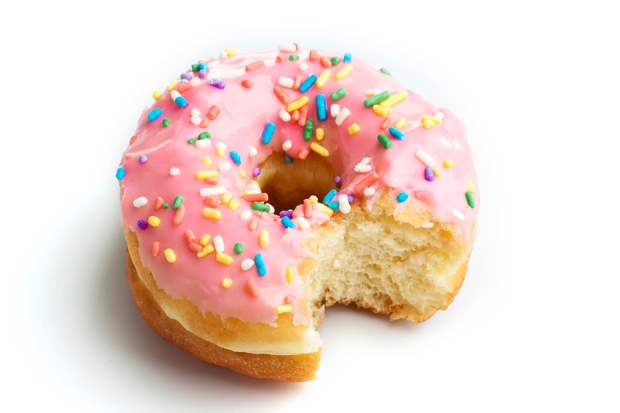If there is one characteristic that accounts for the deep unattractiveness of the modern British, it is their lack of self-control. It is not merely that they lack such self-control as they scream their obscenities in the street, eat everywhere they go, and leave litter behind them: it is that they are actively opposed to self-control on grounds of health and safety. They are convinced that self-control is the enemy of self-expression, without which their existences would be poisoned as if by an unopened abscess.
Therefore the notion, increasingly propounded in the press and elsewhere, that sugar is an addictive substance will be music to their ears — or rather junk food to their stomachs. Not only is self-control bad for you, it has been proved (by science) to be impossible. Further good news is that fatness is genetic. To adapt Blake slightly:
Every night and every morn
Some to obesity are born.
Never has Man’s eternal urge to excuse himself received so much authoritative support.
But as we dispense with these comforting illusions, we must be careful not to be dishonest ourselves. Obesity is a problem; and while it is increasing elsewhere, for example in France, the British are now among the fattest people on earth. It is particularly a problem in the poorer half of the country, whose economy is like that of the Soviet Union with takeaway pizza. Hospitals now have to have special scales and operating tables to deal with patients twice as big as their parents’ generation. The rich are different; they not only have more money but are slimmer — though they, too, are growing fatter. It is true also that there are genetic predispositions to fatness and to Type II diabetes. Likewise that, ever since the Nixon administration’s directive that the prepared-food industry should use less fat in its products for the sake of our health, the sugar content of such food has been rising and huge subsidies have been paid to the farmers of the United States in effect to produce cheap fructose, the nutritionists’ current bête noire.
But none of this abrogates each person’s responsibility (and ability) to control himself. After all, not everyone in even the most depressed area is fat, and while you can lead a single mother to Coca-Cola, you can’t make her drink. I have no fixed objection to government efforts to influence our diet, but the dream of a dictatorship of nutritionists — the enforced monopoly of a diet so perfect than no one will have to choose — seems to me a dangerous chimera. There have been fashions in nutrition as in everything else.
It is worth reflecting on why the British are the fattest people in Europe. After all, everything that they eat is available elsewhere. The answer is not that the British are poorer or more likely to be unemployed than others; it is that their culture is debased. Their belief that self-control is either psychologically harmful or impossible is a laissez-passer for bad habits.
About a fifth of British children eat a meal with another member of their household less than once a week. The results, both social and nutritional, may easily be imagined. Children become hunter-gatherers in their own homes; they eat what they find and what they find is junk. Their meals become nasty, solitary, British, short — and frequent. The elementary social discipline of eating with others is lost to them (even hunter-gatherers eat in bands). A little later in life, the Englishman’s street becomes his dining room, which is why our streets are so littered with the detritus of hastily consumed junk food. Were it not for smoking, the British would be even fatter.
Fat is indeed a feminist issue: but not in the original sense. Mothers, assisted by neglectful fathers, are passing on their parental incompetence from generation to generation. Scores and possibly hundreds of billions of pounds of public expenditure have finally made the dream of the political class come true: people have become the product of their environment, all needful of official assistance. When young offenders were given vitamin supplements in their young offenders’ institution, their behaviour improved.
However, if the British people wait for the government to help them lose weight, or better still not to become fat in the first place, they will be waiting a very long time. What is needed is more akin to a religious revival than to government fiat. I beseech you in the bowels of Christ, must you eat that muck? Or, alternatively, go to the ant, thou sluggard, consider her ways and be wise.






Comments